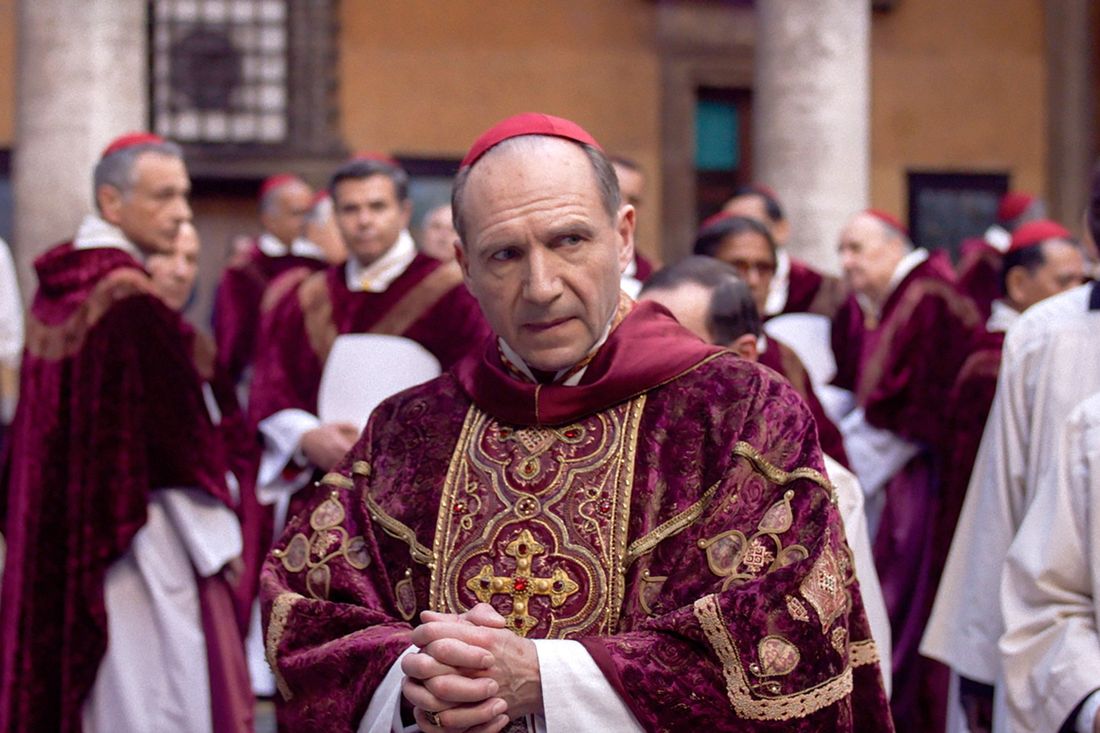
As a cinephile with a penchant for films that delve deep into the human psyche and explore the intricacies of power dynamics, I found myself utterly captivated by Edward Berger’s masterful adaptation of Robert Harris’s novel, Conclave. The film is a riveting blend of high drama and pulp fiction that manages to keep you guessing until the very end.
The story of “Conclave” commences with a cardinal walking nervously along a desolate Roman street late at night, gripping his red cap (biretta) firmly. This striking, almost comical scene depicts a high-ranking cleric trudging through a grimy, contemporary urban landscape in his ornate robes. Although the characters of “Conclave” will primarily remain indoors in Edward Berger’s movie, this contrast between ancient tradition and modern surroundings will persist throughout. These men are engaged in what they perceive as an age-old task: selecting a new Pope, following the demise of the previous one. They strive to isolate themselves from the contemporary world, yet its presence is always felt, lurking just beyond the windows and behind closed doors, constantly influencing their actions.
In the heart of the storm stands Thomas Lawrence (portrayed by Ralph Fiennes), the head of the College of Cardinals, tasked with overseeing the conclave within the revered walls of the Sistine Chapel. As cardinals from various corners of the globe assemble to vote for a new pope, this role suits Fiennes perfectly, given his ability to embody tranquility, intensity, and sometimes a blend of both simultaneously. Thomas projects an air of kindness and understanding. He’s a complex individual grappling with inner turmoil, confessing in his opening speech to the conclave that he appreciates skepticism but detests absolute certainty – yet, as the narrative unfolds, his desire for control over the outcome intensifies.
Berger’s movie is a very accurate portrayal of Robert Harris’ 2016 novel, blending the rapid-paced excitement of an engaging airport read with the weighty impact of serious theater. It somberly shows the intricate rituals surrounding the Pope’s demise – such as the ribbons on his door, sealed with melted red wax, the seals removed from his rings, the unceasing prayers and hushed whispers – giving a slight wink to its apparent futility. Yet, these actions hold significance for those involved, and that is sufficient. Similarly, the slow, somber dance of the conclave, complete with multiple rounds of voting, tallying, and quiet contemplation, also resonates deeply.
In the movie “Conclave,” film critics participating in end-of-the-year awards might find themselves agreeing, as they notice alliances changing based on who’s leading, who seems likely to win, and whose support appears to be weakening. While I can’t confirm if this reflects real cardinal voting processes, both the book and film give off an authentic vibe. It’s intriguing to discover that those deemed Very Serious Men, like popes electors and film critics, can strategize as skillfully as shown in the 2012 New York Film Critics Circle vote, where Rachel Weisz won Best Actress over frontrunners Jessica Chastain and Jennifer Lawrence. Similarly, the historic tie between supporters of “Days of Heaven” and “Deer Hunter” at the National Society of Film Critics in 1978 allowed Bertrand Blier’s “Get Out Your Handkerchiefs” to unexpectedly win Best Picture that year.
In the grand setting of the Conclave, Berger skillfully introduces growing chaos and petty quarrels. Despite his attempts to remain impartial, Thomas supports Aldo Bellini, a forward-thinking candidate advocating for continued Church liberalization and global involvement. On the other hand, Goffredo Tedesco, an Italian traditionalist with conservative views, believes the Church has strayed since the abolition of the Latin Mass in the 1960s. Other contenders include Joseph Tremblay, a politically savvy individual who masks his ambitions behind a façade of humility, and Joshua Adeyemi, a charismatic Nigerian cardinal who could potentially become the first black pope.
Among these individuals, none openly advocate for the papacy, except perhaps the charismatic Tedesco, whose minor role Castellitto transforms into a captivating spectacle. The rest are mostly characterized by furrowed brows, hushed conversations, and professional interactions, all while humbly seeking divine intervention…yet secretly plotting against each other. This subdued game of politics offers an excellent platform for these talented actors, including Isabella Rossellini, portraying a head nun whose role becomes increasingly pivotal, as well as Carlos Diehz, a lesser-known Mexican actor who plays Cardinal Vincent Benitez. Unbeknownst to everyone, Benitez is secretly the Archbishop of Kabul and his unexpected appearance on the day of the conclave sets off a series of unforeseen twists and turns that add an exciting layer to the story.
Regardless of being secluded within the Vatican walls, the priests participating in the Conclave are fully conscious that their actions can significantly impact the Church’s image. This isolation, though psychological, is not without consequence. The story conveys a sense of upheaval happening outside their immediate surroundings, an awareness they may soon acquire, both symbolically and literally. Berger skillfully builds suspense around this impending revelation, culminating in several tense and engaging climaxes. My Telluride Film Festival attendees reacted with joy and astonishment, a reaction echoed by Toronto screenings as well. Therefore, it’s not unreasonable to expect that this captivating film could garner some accolades.
Read More
- Hades Tier List: Fans Weigh In on the Best Characters and Their Unconventional Love Lives
- Smash or Pass: Analyzing the Hades Character Tier List Fun
- W PREDICTION. W cryptocurrency
- Why Final Fantasy Fans Crave the Return of Overworlds: A Dive into Nostalgia
- Sim Racing Setup Showcase: Community Reactions and Insights
- Understanding Movement Speed in Valorant: Knife vs. Abilities
- Why Destiny 2 Players Find the Pale Heart Lost Sectors Unenjoyable: A Deep Dive
- PENDLE PREDICTION. PENDLE cryptocurrency
- How to Handle Smurfs in Valorant: A Guide from the Community
- FutureNet Co-Founder Roman Ziemian Arrested in Montenegro Over $21M Theft
2024-09-12 15:53